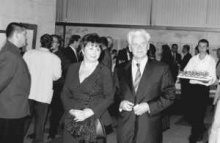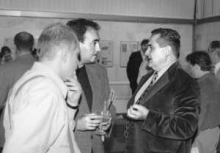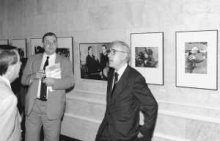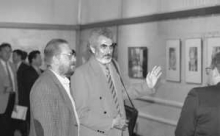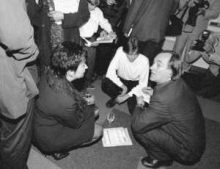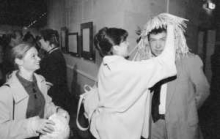Among the guests crowding the exhibition hall one could easily notice the stooped figure of the Lesia Ukrainka Theater’s vividly intellectual chief stage director Mykhailo Reznykovych clad in a light-colored suit. A bright spot in the dark realm of Ukrainian theatrical art.
The Day: What do you like about our newspaper?
A.: You produce a serious and searching newspaper. There is nothing cheap about it. On the one hand, you are free of clannish bias, and of the gutter approach, on the other. Your chief editor put together an excellent team of authors and that’s quite an attainment on her part. Another thing I like is your keen sense of propriety. Oleg Yefremov [once a popular Soviet movie actor, later a controversial stage director in Moscow] said that previously we struggled for freedom of culture and now we have to struggle for the culture of freedom. I think that The Day is trying to do just that.
The Day: And you don’t think it is easy, do you?
A.: I think it is extremely difficult. Actually, we are trying to do the same at our theater, except that we use our own methods. Most importantly, fighting platitudes unites our theater and The Day.
The Day: Do you think we will win?
A.: I very much hope so.
My next question was addressed to the imposing ex-Premier, now People’s Deputy Yevhen Marchuk.
The Day: What do you think impedes The Day’s performance?
A.: I can’t think of anything in particular. Maybe all those dumping sharks hunting in the depths of the ocean of the press.
The Day: Is this supposed to imply that we are defenseless?
A.: On the contrary. Remember what our popular actor Anatoly Papanov said? You hit neat but very strong.
The Day: What would say distinguishes our newspaper from other periodicals?
A.: You show topnotch professionalism. Once you broach a subject you handle it at length and depth and yours is a delicate, not rude approach.
The Day: How would you describe our approach to the Ukrainian political elite: harsh or impersonal?
A.: Accurate.
The Day: You mean photographic precision?
A.: No, I wouldn’t go that far, although your photo exhibit is excellent. You try to be unbiased in your appraisals. It’s like a smooth mirror reflection.
The Day: Are there many periodicals in Ukraine you would describe as false mirrors?
A.: More than I care to recall, but I wouldn’t blame this on journalists. It’s all those ordering them to dig up information making these false mirrors. I also hope Ukraine will not turn into a kingdom of false mirrors. I know of many people who do not accept this approach.
The Day: Turgenev once said about Nekrasov’s collection of verse: “Put together in a single collection, these poems are burning to the touch.” Would you say the same about our newspaper?
A.: I think that using The Day as a magnifying glass and focusing it on certain persons would cause them to suffer a sunstroke. To others it could serve as a guiding light.
The Day: Sounds like a working motto. Do you think the game is worth it?
A.: Certainly. And you deserve every praise for continuing to work despite that boisterous compromising campaign, for keeping in your calm restrained vein despite the buckets of dirt being emptied all around you. I appreciate your sense of proportion. Your coverage extends to various political forces, including interviews with the Communist Kriuchkov and Rukh leader Chornovil. Ambassadors from a number of countries — China, the United States, Germany — feel honored to be interviewed by The Day. This is evidence of your high class, because these dignitaries have no clannish affiliations, they do not have to adjust their attitude, so their choice is perfectly unbiased. Another important factor is that The Day comes off the presses in three languages. A hell of a difficult job technically!
The Day: How do you usually start on the issue?
A.: Frankly, I start with your comic strip. Your artist Kazansky shows European class. And then, of course, Mr. Khvostiv’s “Events Auction.”
In both cases I am attracted by the humor which is not straightforward but subtle, with a lot of understatement. Also, I am fond of your big analytical articles. I wish you had more of them. And Klara Gudzyk’s spiritual material deserves special notice. All this put together creates the newspaper’s attractive visage, making it a singular periodical.
He is probably Ukraine’s most popular actor. Seeing me approach, the man had that special sly look he reserves for the media. Touching my tape recorder, he smiled:
“Does the thing really work?”
I said it did and that I could show him the batteries. Brand new, in perfect order. He was satisfied and said I could now ask my questions.
The Day: The first one is rather traditional. We all hold you in esteem, so how do you feel about our newspaper?
A.: I don’t read newspapers. Sholem Aleichem’s Tevye asks Fedor:
“What’s new in the papers?”
“Well, the usual stuff. Cholera in Odesa and pogroms in Kishinev.”
“Oh,” says Tevye, “and to think that one has to pay to read such news!”
The Day: We never try to scare our readers.
A.: All right, I’ll let you in on a secret. The Day is the only newspaper I read, off and on. And I like the title. You see, when it gets dark one must either have sex or turn in for the night. I like daylight when I can meet with people and work.
The Day: Has our newspaper inspired you to play new roles?
A.: Now this is something I haven’t experienced as yet. Guess I’ll have to read it more carefully.
He looked his old disheveled and glum self.
The Day: What do you think is this newspaper’s principal mission?
A.: It broaches vital subjects, just the right kind for the Ukrainian elite.
The Day: You really think there are subjects capable of enlivening our elite?
A.: I’m positive. The elite has to be and wants to be kept informed. And these people are anxious to know about themselves. You cover a lot of ground in this sense.
The Day: How do you feel about our allocating so much space for politics?
A.: Politics is life. Moreover, it is one of the cultural needs these days. It permeates government bodies and volunteer organizations, and is getting to the man in the street, because people are becoming aware that each and everyone can take part in building this society. Not the way it was under the Soviets when we were all made into a large herd of dumb domesticated animals with the herdsmen telling us everything belonged to us and we had to decide what to do next. So we decided on visiting the nearest liquor store. Now we begin to understand that by casting our votes we can actually elect people to make the decisions for us. People are getting interested in politics.
The Day: Do you mean that the middlebrow has become aware of the counter-reaction?
A.: No, not yet. But he will soon enough.
This man is known throughout Ukraine as the host of a popular TV program discussing “taboo” subjects like male prostitution, contract killing, etc.
The Day: Would you tell me what brings you here?
A.: Actually, I was the first to spot your excellent photo exhibit. We were celebrating the third anniversary of 1+1 on the premises, so I just happened to drop in. Congratulations! You people did a very good job. Everything’s top quality and this doesn’t happen often now. Another reason I am here is because I like meeting with colleagues.
The Day: You mean you came to attend yet another bohemian gathering together?
A.: No, and I don’t like the words bohemian and gathering together. I am not the gathering-together type. Here the atmosphere is quite different. People came not to have a ball, but to discuss interesting subjects and share serious ideas.
The Day: How about interesting subjects in our newspaper?
A.: I’m not much of a newspaper reader, but I like The Day, for the simple reasons that it does look like a normal newspaper, the way I see it.
You are not doing business, if you know what I mean, you are trying to explain things happening around us, and this is always contrary to pure business.
The Day: What would you personally single out as the newspaper’s specificity?
A.: Apparently you know more than you write about.
The Day: You mean other papers know less and write less?
A.: That’s right. The Day is the most informed analytical periodical. However, the problem is that different newspapers represent different political forces, whereas the reader wants to see each page cover another political force.
The Day: We try to maintain an objective approach.
A.: Perhaps you do, but there are cases when one wants to hear the other side and often finds nothing of the kind. Still, you have a well-selected journalistic staff and your chief editor knows her bearings and correctly assesses any given situation. As for popularity, I am with The Times, rather than The Sun, even though The Sun sells better. If you can correct the shortcoming I have just mentioned, you’ll have only one step to make to achieve absolute perfection.
The Day: We’ll do our best, thank you.

